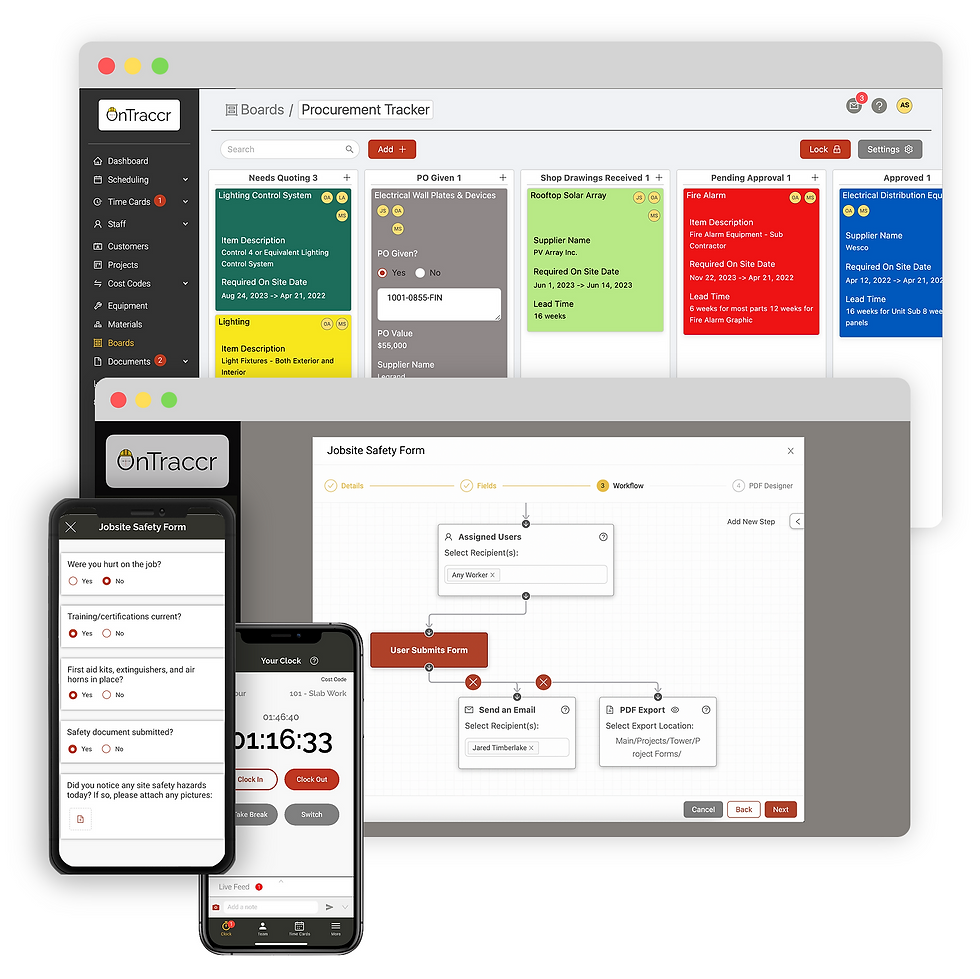In today's fast-paced and competitive construction industry, efficient project management is the key to success. With numerous moving parts, tight deadlines, and complex workflows, staying organized and maintaining control over projects can be a daunting challenge. That's where project management software comes in.
Amidst the influx of cutting-edge technologies such as 3D printing, AI, and AR/VR into the construction industry, a recent industry survey has shed light on a fascinating revelation. Despite the allure of these flashy innovations, construction professionals resoundingly proclaim that project management software remains the ultimate game-changer. In terms of technology investments, its effectiveness stands head and shoulders above the rest.
In this blog post, we'll explore why project management software is the most critical technology decision a construction business can make, revolutionizing how projects are planned, executed, and delivered.
Streamline Workflows and Enhance Efficiency
One of the primary benefits of project management software is its ability to streamline workflows and enhance overall efficiency. By centralizing project data, documents, and communications in a single digital platform, teams can collaborate seamlessly, saving time and eliminating costly errors.

From task assignment and progress tracking to document management and scheduling, project management software empowers construction businesses to optimize processes and deliver projects on time and within budget.
Real-Time Visibility and Communication
Effective communication is the lifeblood of any successful construction project.
Project management software provides real-time visibility into project status, allowing team members, stakeholders, and clients to stay informed and aligned at every stage. Instantaneous updates, notifications, and dashboards enable prompt decision-making, issue resolution, and efficient resource allocation.
By fostering transparent and open communication channels, project management software enhances collaboration, reduces misunderstandings, and ensures everyone is on the same page.
Accurate Cost Control and Budget Management
One of the biggest challenges in construction projects is controlling costs and managing budgets effectively. Project management software offers robust features for cost estimation, budget tracking, and expense management.

By integrating financial data with project timelines and resource allocation, businesses can accurately monitor expenditures, identify cost overruns, and make informed adjustments. With real-time insights into project finances, construction companies can make proactive decisions to keep projects financially viable and profitable.
Risk Mitigation and Document Control
Construction projects involve a vast amount of documentation, ranging from contracts and permits to drawings and specifications.
Project management software serves as a centralized repository for all project-related documents, ensuring easy access, version control, and secure storage. By organizing and tracking critical documents, businesses can mitigate risks associated with document loss, misplacement, or outdated information.
Additionally, project management software allows for enhanced collaboration on documents, facilitating seamless review cycles and reducing delays.
Improved Client Satisfaction and Relationships
Client satisfaction is the cornerstone of a successful construction business. Project management software plays a pivotal role in delivering exceptional client experiences.
Through clear and consistent communication, transparent progress tracking, and timely issue resolution, businesses can foster stronger relationships with clients. The ability to provide real-time project updates, share documentation, and address client concerns promptly enhances trust, credibility, and client satisfaction.

Tips for Selecting Project Management Software
When it comes to selecting the right project management software for your construction business, making an informed decision is key. With numerous options available in the market, it's crucial to prioritize your business needs and find a software tool that aligns with your specific requirements.
Define Your Business Needs
Before selecting a project management software tool, clearly outline your business requirements, project complexities, and team collaboration needs. Identify key features and functionalities that align with your specific workflows and project management goals.
Scalability and Flexibility
Consider the scalability of the software to accommodate your business growth and evolving project demands. Look for a flexible solution that allows customization and integration with other tools or software systems your business relies on.
User-Friendly Interface
Ease of use is crucial for user adoption and productivity. Ensure the software has an intuitive interface, with clear navigation and accessible features. Conduct demos or trials to evaluate the user experience and gather feedback from potential users within your team.

Mobile Compatibility
In today's mobile-driven world, having access to project information on the go is essential. Look for project management software with mobile applications or responsive web interfaces that enable remote access and collaboration, regardless of the device being used.
Integration Capabilities
Check if the software can seamlessly integrate with your existing tools such as accounting software, scheduling applications, or document management systems. Integration eliminates data silos and enhances data accuracy, saving time and reducing manual data entry.
Data Security and Privacy
Construction projects involve sensitive information, including financial data, contracts, and client details. Ensure that the project management software prioritizes data security through encryption, user access controls, and regular backups. Confirm that the software complies with relevant data protection regulations.
Potential Pitfalls to Avoid
Overspending on Unnecessary Features
While feature-rich software may seem appealing, investing in functionalities that you won't fully utilize can be wasteful. Prioritize the essential features that align with your business needs and budget accordingly.
Insufficient Training and Onboarding
Transitioning to a new project management software requires proper training and onboarding for your team members. Neglecting this aspect can lead to underutilization of the software's capabilities and hinder the expected benefits. Allocate resources for comprehensive training and ongoing support.
Ignoring User Feedback
Involve key stakeholders and potential software users in the evaluation and selection process. Their insights and feedback are valuable for understanding specific needs and ensuring successful adoption. Disregarding user feedback may result in dissatisfaction and resistance to change.
Neglecting Vendor Support and Updates
Assess the vendor's reputation for customer support, software updates, and maintenance. Ensure that they provide timely support, address issues promptly, and release regular updates to enhance software performance and security.
Final Thoughts
In the digital age, project management software has become an indispensable tool for construction businesses seeking to thrive in a competitive market. With its ability to streamline workflows, enhance communication, control costs, mitigate risks, and improve client satisfaction, project management software empowers businesses to achieve operational excellence and deliver successful projects more than any other category of construction technology can.
Embracing this technology decision is no longer optional—it is the foundation for sustainable growth, profitability, and a competitive edge in the construction industry.






